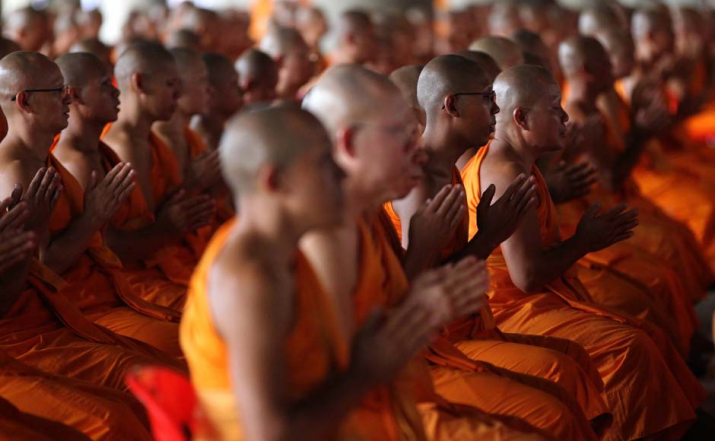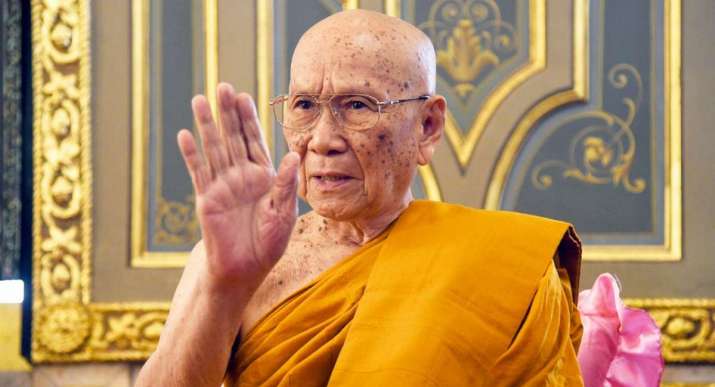NEWS
Senior Thai Monks Must Declare Assets According to New Regulation
 Thai monks. From asiancorrespondent.com
Thai monks. From asiancorrespondent.comAll Buddhist monks in Thailand with seats in university councils will need to declare their assets, according to a new rule enforced by the National Anti-Corruption Commission (NACC). Only the Supreme Patriarch Somdet Phra Sangharaja, who chairs the Mahamakut Buddhist University’s council— Mahamakut Buddhist University is the most important university for monks in Thailand—, is exempt from the rule as he has been chosen and appointed by King Maha Vajiralongkorn.
The asset and liability regulation was issued on 1 November under a new anti-corruption law and is the latest measure to counter corruption, expanding the categories of persons required to declare their assets to the NACC to senior officials in the public sector, including high-level monks who sit on university councils, top executives of public organizations and state funds, and chiefs of the Armed Forces.
The rule, which is scheduled to take effect on 2 December, led to much furor. Many officials and monks threatened to leave their posts should the NACC’s new requirement be enforced. Following a discussion with the Thai government’s legal expert, Deputy Prime Minister Wissanu Krea-ngam, the NACC proposed delaying the enforcement of the regulation to allow for universities and other public bodies to fill the posts left empty by the resignations.
“What we can do for them now is to consider postponing the day the new rule becomes effective,” said NACC president Pol General Watcharapol Prasarnrajkit, “but we can’t exempt them from asset declaration.” (The Nation)
“This way [by postponing the enforcement if the rule] , current council members will have more time to reflect and prepare themselves. Those who stay can prepare asset declarations. For those who will quit, they can do so. Affected university councils should have enough time to fill vacant seats,” added Watcharapol. (The Nation)
 Supreme Patriarch Somdet Phra Sangharaja. From nationmultimedia.com
Supreme Patriarch Somdet Phra Sangharaja. From nationmultimedia.comThailand’s Buddhist establishment has be plagued by a growing number of allegations of corruption and reports of the misbehavior and extravagant lifestyles of some monks. Following the 2014 coup d’état, the monastic sangha came under increased state control. The military junta has proposed requiring temples to open their finances to the public and requiring monks to carry smart cards to identify their legal and religious backgrounds.
In 2016, the Department of Special Investigation (DSI) probed the assets of senior monks on the Sangha Supreme Council, the governing body of the monastic sangha, resulting in tax evasion allegations against the most senior member of the council who was in line to become the supreme patriarch. The incident led to a change in the law in January 2017 that allowed the Thai king the right to nominate the head of the highest ecclesiastical position in the country's monastic order, restoring a tradition that was abolished in 1992. Supreme Patriarch Somdet Phra Sangharaja was appointed one month later.
Thailand is a predominantly Buddhist country, with 93.2 per cent of the country’s population of 69 million identifying as Buddhists, according to 2010 data from the Washington, DC-based Pew Research Center. The country has approximately 38,000 temples and a population of some 300,000 monks. Although full bhikkhuni ordination is not recognized in Thailand, a number of groups of female renunciants exist, some of whom have been ordained overseas, although they do not enjoy the same level of social acceptance as their male counterparts.
See more
NACC stands firm on asset rule (Bangkok Post)
Supreme Patriarch spared asset rule (The Nation)
Asset-declaration rule likely to be revised (Bangkok Post)
PM steps in amid furore over asset declaration rule (The Nation)
Related news from Buddhistdoor Global
Thai King Strips Spiritual Head of Dhammakaya Sect of Royal Title
Thailand Appoints New Supreme Patriarch to Head Monastic Sangha
Nine Thai Officials Charged with Embezzling Temple Funds














